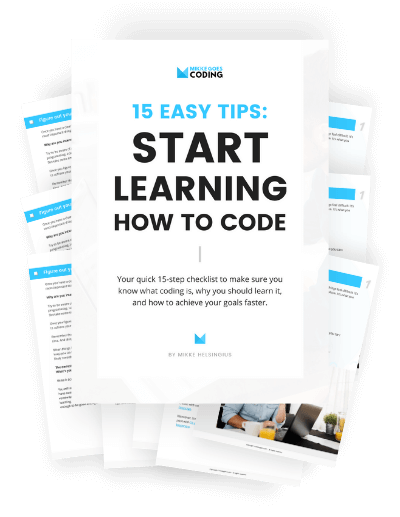Lots of people start learning to code in the hope of landing their dream job in tech and achieving more freedom and flexibility in life.
But when it’s time to apply for your first entry-level developer job, how can you make sure you sell your skills to potential employers? What’s going to make you stand out from dozens or hundreds of applicants for the role?
And how do you know if you’re qualified enough for the job? If you’ve ever seen an entry-level job description with a seemingly endless list of requirements and felt intimidated, you may have let a good opportunity pass you by.
In this guest post, Joy Garza from Seen by Indeed tells us how to impress recruiters, highlight your top skills, and nail your next job interview.
By the end of the post, you’ll know what employers really want from entry-level applicants, how to learn the right skills, and how to build a resume that gets noticed.
Take it away, Joy!
Please note: This post contains affiliate links to products I use and recommend. I may receive a small commission if you purchase through one of my links, at no additional cost to you. Thank you for your support!

Whether you recently graduated or are preparing for your career while still in college, your upcoming transition from student to tech professional is reason to celebrate. But while entering the next chapter of your tech career is an exciting time, actually landing your first role as an entry-level software developer isn’t always easy.
Not only is the tech job market a competitive one, but some employers hiring for entry-level software developers are looking for candidates with a couple years of experience—sometimes even more. So when you’re fresh out of coding bootcamp or college, you’re left wondering how you’re going to get your foot in the door (and sooner rather than later).
The good news is there are plenty of ways to impress recruiters and hiring managers despite having zero professional experience. Keep reading for actionable steps to learn how, from developing your skills to selling them.
What do employers really want?
There’s no one way to define “entry level” because every employer and role is different. But there are ways to figure out which roles you qualify for even if the job description lists requirements outside your experience.

Decoding the job description (and when you should apply)
The main thing to remember when browsing through open positions is that you shouldn’t automatically disqualify yourself from a role just because an employer includes one or two years of experience and a long list of must-have requirements. Why? There’s a good chance those “requirements” are more of a wish list.
Plus, “experience” might not always mean professional working experience. Education, internships and roles with transferable skills all might count towards years of experience.
All this to say: Any time you come across a role that excites you, ask yourself if you can perform the main responsibilities. Can you see yourself succeeding and adding value to the team? If so, go ahead and apply.
Soft skills are a big deal
Any candidate matching a job description 100% may look more desirable off the bat, but employers know there’s more to a great software developer than hard skills alone.
As it turns out, soft skills play an important role when it comes to impressing recruiters and hiring managers. And while selling your soft skills is key to landing any role, it’s especially valuable when you’re breaking into tech and competing with candidates that have the professional experience you might lack.
Some of the soft skills hiring managers look for most in software developers:
- Communication
- Problem-solving
- Teamwork
- Adaptability
- Leadership

Showcase your soft skills at every stage of the interview process, starting with your resume and into the final interview rounds.
In your resume: Review the job description. See any soft skills? For entry-level roles in particular, there’s a good chance you’ll find qualities like “willingness to learn,” “collaborative” or “adaptable.”
Highlight these soft skills in your resume, but don’t just list them off one by one without any context. Instead, illustrate that you have the desired soft skills within your bullet points, using data and numbers to show what you can bring to the table.
Suppose an employer wants a developer who can “manage time effectively while working with minimal direction.”
Dedicate one bullet point to describing a time when you independently prioritized a handful of tasks to successfully deliver a project two weeks ahead of schedule.
In your interviews: From “tell me about yourself” to “tell me about a time you disagreed with your manager,” just about every open-ended or situational question is a chance to talk up your soft skills.
Say the hiring manager wants to hear about a time you resolved conflict with a coworker. What do they really want to hear?
A response that’ll help you stand out not only describes the conflict, but the steps you took to resolve the issue as well as the final outcome.
By weaving in these details, you’ll demonstrate that you have a number of soft skills: conflict resolution, communication, negotiation, flexibility, cooperation and more.
Build up your tech skills (and show them off)
In tech, now’s always a good time to develop your skills. Continual learning not only keeps you competitive and helps beef up your resume, but it’ll likely earn you bonus points with recruiters and hiring managers as it demonstrates your dedication, desire to learn and passion for tech.
Plus, you can leverage all of the experience and expertise you gained once the negotiations begin.
Practice coding. There’s no shortage of practice coding websites (many of them are free) where you can sharpen your skills.
From solo coding challenges to a game of friendly competition with fellow programmers, get hands-on practice with sites like CodeWars, HackerEarth and Exercism.
Bonus: Solving coding challenges is a great way to prepare for coding interviews like take-home coding assignments and whiteboard challenges.
Or, try an online course or coding book to learn a new programming language.

Pick up a side project. Much like extra coding practice, devoting time to a side project can accelerate your learning. It also gives you the chance to try new technologies and test out product ideas.
What’s more, creating something new from scratch is proof of what you can do. Use these projects to build up your portfolio and GitHub profile to showcase your code to would-be employers.
Earn a certification. One of the best times to earn a certification could arguably be when you’re breaking into tech.
Note that being certified isn’t a substitute for education or skills, but can help authenticate your skills and give you an edge over your competition.
Choose the right certification for you: Consider your career goals, the languages you enjoy working with most and what tech skills are in high demand.
For example, because Python is one of the fastest-rising tech skills (and generally easier to learn than other languages), a Python certification could be a smart move if you’d like to grow into a back-end web developer role.
Create a software developer resume that gets noticed
Crafting a resume with minimal (or no) professional experience might leave you with more questions than answers.
On top of it all, you’re not just competing with fellow job seekers: More and more resumes are being scanned (and weeded out) by applicant tracking systems before they ever have a chance of making it into the hands of a recruiter. This means optimizing your resume for humans and robots is a must.

Call out the right tech skills. Include a technical skills section near the top of your resume, but don’t use this space as a catch-all for every skill you’ve ever used. Rather, add in the most relevant skills to the role you’re applying for.
Review the job description and take note of what’s required and preferred. Have experience with these skills? Put them at the top of your list. This will help recruiters quickly make a connection between the role requirements and your qualifications.
Tailor your resume. This doesn’t mean writing a new resume from scratch every time you apply for a role, but simply tweaking some of the details (e.g., technical skills, bullet points, summary) to closer align with the job description.
Say a web developer job posting stresses the importance of understanding web best practices and responsive design. If you have this expertise, you’d want to highlight it as your first bullet point in either the experience or projects section.
Another way to tailor your resume is by adding in keywords found within the job description, which shows that you’re a good fit and understand what the employer is looking for in a candidate. (Including the right keywords will also help get your resume past any ATS bots.)
Escape the catch-22 of entry-level software developer roles
Waiting to land your first software developer role? Use this time to your advantage. Build up your portfolio, add more green to your GitHub, learn in-demand skills and practice your interview techniques.
Remember, hesitating to apply for a role because you don’t think your qualifications match is natural.
But don’t let a good opportunity pass you by because you’re only missing a requirement or two. If you see a role that aligns with your skills and goals (and gets you excited about your future in tech), apply!
About the author
Joy Garza is a Tech Career Writer for Seen by Indeed, the service that connects tech talent to leading brands and startups, where she writes about career advice and industry trends to help tech professionals find success.


